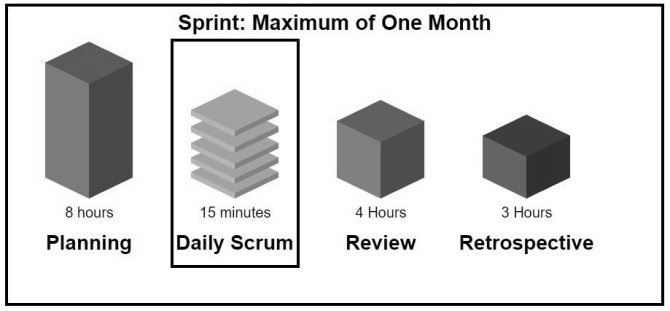Is the daily Scrum recommended for colocated teams?
Is the daily Scrum not for colocated teams?
The assertion that the daily Scrum is not recommended for colocated teams is false, for the following reasons:
- The daily Scrum is a non-negotiable requirement for all teams that do Scrum.
- Colocated Scrum teams follow the exact same Scrum rules that distributed teams follow.
What is a colocated Scrum team?
The word colocate means to place together. Generally speaking, developers on a Scrum team are collocated if the following are true:
- Members sit close together in a shared, open-office space.
- Line of sight exists between Scrum team members.
- Conversations between team members are easily overheard.
- Members of the team work the same overlapping hours.
The opposite of a colocated Scrum team is a distributed team where each member is in a different geographic location. On a globally distributed team, members may not even work overlapping hours due to time change differences.
What happens in the daily Scrum?
The daily Scrum brings together all developers on the team to informally discuss the three daily Scrum questions, namely:
- What did you accomplish yesterday?
- What do you plan to do today?
- Have you run into any blockers to development?
This question about whether the daily Scrum is recommended for colocated teams plays into a common misconception about Scrum. That is, if developers work together closely in a small, open space, then a daily Scrum is unnecessary since the lines of communication are always open between members of the Scrum team.
It’s not an illogical thought. However, in terms of Scrum, the assertion that there are situations where the daily Scrum is not needed is false.
Scrum demands that the daily Scrum occur every workday throughout the sprint. It doesn’t matter if the team members are colocated or not.
The daily Scrum and colocated teams
Many people complain that there are too many meetings in Scrum. The daily Scrum is typically the target when such complaints arise.
Scrum practitioners should remember that the daily Scrum does not need to be an heavily formalized ritual. Yes, it’s timeboxed to 15 minutes, but that’s an upper limit. That doesn’t mean the daily Scrum can’t be shorter.
If three or four developers are all colocated in the same room, they will naturally talk to each other when they arrive for work in the morning. Casual conversations are natural when people work together.
When you see a co-worker in the morning, you naturally talk about things such as:
- Last night’s hockey game.
- The traffic on the way in.
- The things that you accomplished yesterday.
- How much the last email you got from management annoys you.
Scrum simply wants developers to harness the natural desire for people to converse with each other and focus it for maybe five or 10 minutes to talk about topics such as:
- What they’re excited about having accomplished recently.
- What they’ve set their mind to accomplish together.
- Insights they’ve learned that they want to share with the team.
- Issues they may need help with in order to achieve the sprint goal.
Colocated teams can’t skip the daily Scrum
The daily Scrum is just a chance for developers to catch up with each other, discuss their progress and adjust their plans if any unforeseen circumstances have arisen.
The daily Scrum shouldn’t be over-formalized, it shouldn’t be run like a status meeting and it shouldn’t feel like a hindrance. If it feels like any of those, you’re not doing the daily Scrum right.
The daily Scrum must run every single workday during a sprint or else your team is engaging in ScrumBut. As the Scrum Guide says: “The Scrum framework is immutable. While implementing only parts of Scrum is possible, the result is not Scrum. Scrum exists only in its entirety.”




